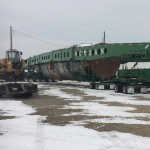'Megaload' convoy expected to pass through this area over weekend

A series of "megaload" convoys of giant evaporators destined for the tar-sands region north of Edmonton, Canada, are expected to begin passing through Elmore County this week.
The Idaho Transportation Department expects the first of the megaloads to pass along I-84 from Hammett to Mountain Home, before turning north on Highway 20, beginning either Saturday or Sunday night. The loads only move at night, between 10 p.m. and 6 a.m.
Travelers are being advised to expect delays of up to 30 minutes while the convoys are on the move.
The convoys must pull over at regular intervals to let vehicles pass and they typically travel less than 60 miles a night. The convoys are accompanied by pilot cars and flaggers that can stop traffic where needed until the convoy reaches a turnout area allowing it to stop for other traffic to move along the road.
The megaloads are 23 feet wide and 19 feet tall and range in size from 350-380 feet long. They weigh between 400 and 450 tons each and are transported on specially-designed carriers to help distribute the weight safely. "They're very high tech," said Adam Rush, a spokesperson for the Idaho Department of Transportation.
Because of the height, width and weight, some routes are not possible because of overpasses, roads that are too narrow, or bridge axel-weight limitations. The routes have been carefully mapped out to avoid those problems. In some areas, overhead power lines have to be taken down while the routes pass by.
As of Christmas Day, one of the shipments was in Marsing, a second was in Pendleton and a third awaited departure from the Port of Umatilla. The convoys were expected to begin moving Friday, Rush said.
The route will follow Highway 78 through Owyhee County, cross the Snake River in the vicinity of Indian Cove and go to Hammett, then back out on I-84 for a brief trip to Mountain Home, where it will then take Highway 20 to Idaho Falls and from there travel along U.S. 93 through Salmon to Montana.
The evaporators are designed for recycling water from steam injected underground to melt out bitumen, a substance that's refined into crude oil.
Most of the opposition to the megaloads comes from environmentalists opposed to production techniques that extract oil from tar sands. At one point in Oregon, activists chained themselves to the trucks and disabled a vehicle, forcing part of the load to be dismantled.
In addition, the Nez Perce tribe opposed the megaloads shipments last summer because they would pass through tribal territory. In addition, residents along the U.S. 12 route in Idaho (Lolo Pass, which is a more direct path across the state) didn't want the megaloads in their stretch of the road along the Middle Fork Clearwater and Lochsa rivers, contending the shipments would create safety hazards and block access to recreational and scenic opportunities along that route.
A federal judge in September ruled in favor of the Nez Perce Tribe and Idaho Rivers United, blocking further megaload transports on U.S. 12 until the U.S. Forest Service could complete a corridor study and consult with tribal leaders. The injunction forced the company that makes the evaporators, and its moving firm, to take a much longer route through eastern Oregon and then southern and central Idaho in order to get the equipment to Alberta.
A more direct route north from the Port of Umatilla on the Columbia River, where the loads began their road journey, faced numerous issues with overpasses and other details that would have blocked the movement.
